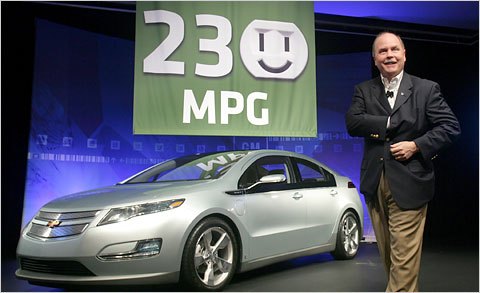Volt Birth Watch 185: EPA Still Not Buying 230 MPG Number
Production of Chevy Volt “integration models” began last week, as Hamtramck tools up for final production of GM’s wundercar, but GM still isn’t saying anything about the car’s two most important features: the pricetag and EPA rating. The General has hemmed and hawed on the Volt’s price over the last several years of hype, but it hasn’t ever been shy about touting an “expected” 230 MPG rating. Because apparently it’s the EPA’s job to clear up GM’s misleading marketing claims. So what is the deal with that 230 MPG number, anyway?
“The 230 mpg number talked about a few months ago was based on some preliminary discussion with the EPA,” said Andrew Farah, the vehicle chief engineer on the Chevrolet Volt and Opel Ampera, when asked if the number is still relevant. “Those conversations have been continuing and have not yet come to a conclusion.”
After the media conference call, Inside Line asked Rob Peterson, GM’s Volt spokesman, if the Volt’s fuel economy is still up in the air.
“I couldn’t have said it any better,” he replied.
“The discussion continues to go on between the EPA and GM,” Peterson said. “[We’re] working together to come up with a number that works best for the consumer.”
Now, try to imagine the case for the 230 MPG number being a good thing for consumers. Sure, miles-per-gallon is the standard measure, but the idea that consumers will ever be able to drive 230 miles on one gallon of gasoline is simply laughable. But the Volt project has always started with a big eco-marketing number (it started with “40 miles without burning a single drop of gasoline”) with the car being built to suit. So, will the EPA stick to its guns? One thing is for certain: if the Volt goes on sale with a 230 MPG window sticker, the Government Motors conspiracy theorists are going to have a freaking field day. Especially considering that the Volt’s rating appears to come down to “negotiations” between GM and the EPA.
UPDATE: The Detroit News paraphrases Chief Engineer Andrew Farah as saying that “road testing shows the Volt is meeting its targets, including achieving a 40-mile range on batteries alone and the goal of 50 miles per gallon when the range-extending gasoline engine kicks in.”
More by Edward Niedermeyer
Latest Car Reviews
Read moreLatest Product Reviews
Read moreRecent Comments
- MaintenanceCosts E34 535i may be, for my money, the most desirable BMW ever built. (It's either it or the E34 M5.) Skeptical of these mods but they might be worth undoing.
- Arthur Dailey What a load of cow patties from fat cat politicians, swilling at the trough of their rich backers. Business is all for `free markets` when it benefits them. But are very quick to hold their hands out for government tax credits, tax breaks or government contracts. And business executives are unwilling to limit their power over their workers. Business executives are trained to `divide and conquer` by pitting workers against each other for raises or promotions. As for the fat cat politicians what about legislating a living wage, so workers don't have to worry about holding down multiple jobs or begging for raises? And what about actually criminally charging those who hire people who are not legally illegible to work? Remember that it is business interests who regularly lobby for greater immigration. If you are a good and fair employer, your workers will never feel the need to speak to a union. And if you are not a good employer, then hopefully 'you get the union that you deserve'.
- 28-Cars-Later Finally, something possibly maybe worth buying.
- EBFlex The simple fact is very small and cheap ICE vehicles have a range thats longer than all EVs. That is the bar that needs met. And EVs cannot meet that.Of course range matters. But that's one element of many that make EVs completely ineffective at replacing ICE vehicles.
- Wolfwagen I like the exterior mods short of the satellite dish. Put a normal interior in it and they could have sold it as some sci-fi movie trim


































Comments
Join the conversation
It's a simple "slap in the face" to the EPA's standardized test. Every vehicle is to follow this standardized test, given by the EPA, and the final mpg number is calculated. Over the years, the EPA standardized test for mpg has been criticized by the industry for not being applicable to real-world driving. By following the standardized test, with the Volt, and legitimately reporting the number (230 mpg), it forces the EPA to finally reconsider its standardized test. Since the Volt is so new in concept, and with the Leaf (among other electrics) coming to market, the EPA has to reevaluate its testing procedure for mpg and realize that there really is no such thing as a "standardized test" for all vehicles.
To all those that think 230 mpg is too high: If I drive a Volt 30 miles a day for a year and never refill it, what is my mpg? The problem is not the number. It's the EPA thinking it needs a single number.